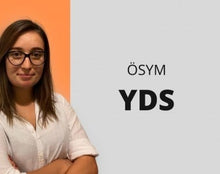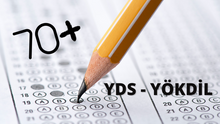Bu eğitimde, YDS’de gerekli olan İngilizce kelimeler öğrenilecek, adaylarda eksik görülen ve tamamlanması gereken dil bilgisi konuları öğretilecektir. YDS’de adaylar uzun paragraf soruları ile karşılacağından okuduğunu anlama ve yorumlama (inference) üzerine güncel teknik ve taktik bilgiler öğrencilere verilecektir. Kelime listeleri ve mini sınavlarla adayların kelime bilgisini artırmaya yönelik çalışmalar yapılacaktır. Bunlara ek olarak ilerleyen dönemlerde deneme sınavları ve çıkmış sorular öğrencilerle paylaşılacaktır.
YDS sınavına hazırlık kursu konu başlıkları
PRONOUNS, ADJECTIVES AND ADVERBS
Pronouns and Adjectives Subject and object pronouns Possesive adjectives-pronouns Reflexive pronouns Adjectives and Adverbs Comparative Superlative As/so adjective/adverb as Too/enough So adjective/adverb that Such (a/an) adjective noun that
SENTENCE STRUCTURES AND TENSES
Simple Tenses and Time Expressions Present simple Past simple Future simple Progressive Tenses and Time Expressions Present progressive Past progressive Future progressive Perfect Tenses and Time Expressions Present perfect Past perfect Future perfect Tense Agreement in Time Clauses
MODALS AND MODAL-LIKE EXPRESSIONS
Expressing Ability Can Could Be able to Expressing Possibility May Might Can Could Expressing Polite Request Can Could Will Would you I wonder if Asking/Giving Permission Can May Could Do you mind Would you mind Expressing Obligation / Necessity Must Have to Need Giving Advice Should Ought to Had better Expressing Prohibition / Lack of Necessity Mustn’t Don’t / doesn’t have to Needn’t Don’t / doesn’t need to Modal Perfect May + have past participle Might + have past participle Could + have past participle Should + have past participle Ought to + have past participle Need + have past participle Must + have past participle
PASSIVE VOICE
Passive Forms of Simple Tenses Passive Forms of Progressive Tenses Passive Forms of Perfect Tenses Passive Forms of Modals and Perfect Modals
GERUNDS, INFINITIVES AND PARTICIPLES
Functions of Gerunds and Infinitives Gerunds/infinitives as subject Gerunds/infinitives as object Gerunds after the verb “be” Infinitive after the verb “be” Verbs and Structures Followed by Gerunds and Infinitives Use of Participles as Noun, Adjective and Adverb
RELATIVE CLAUSES
Defining-Non Defining Relative Clauses Who Which That Whom Where When Why Whose Cleft Sentences Which, Refering to a Whole Sentence Reduction in Relative Clauses Tense Agreement in Relative Clauses
NOUN CLAUSES
Noun Clauses Starting with “Whether”, “If”, “That” Verbs and structures followed by that Verbs and structures followed by “whether”, “if” Use of “the fact that” Difference between “whether” and “if” Noun Clauses Starting with Question Words Who Which What How Where When Whose Whom Tense Agreement in Noun Clauses Reduction in Noun Clauses
CONDITIONALS AND WISH CLAUSES
If Clauses Type 0, 1, 2, 3 Mixed Time in Conditionals Inverted Conditionals Other Conditionals Unless In case Provided (that) Providing (that) On condition that Suppose that Supposing that Assuming that Wish Clause
ADVERBIAL CLAUSES AND TRANSITIONS
Adverbial Clauses Cause and effect Contrast Time Purpose Result Transition Words Opposition Addition Result Time Negative condition Emphasis Explanation Reduction in Adverbial Clauses Tense Agreement in Adverbial Clauses
PREPOSITIONS & PREPOSITIONAL PHRASES
Identifying Prepositions Expressing time Expressing place Expressing movement Before / after nouns Before / after verbs Before / after adjectives
TRANSLATION STUDIES
Translating from English to Turkish Translating from Turkish to English
DIALOGUE COMPLETION
Completing the Dialogue with the Correct Sentence
RESTATEMENT
Finding the Synonym of the Given Sentence
PARAGRAPH COMPLETION
Completing the Paragraph with the Correct Sentence
IRRELEVANT SENTENCE
Identifying Irrelevant Sentence in the Paragraph
PARAGRAPH STUDIES
Reading the Paragraph Carefully Choosing the Correct Answer to the Questions about the Paragraph




